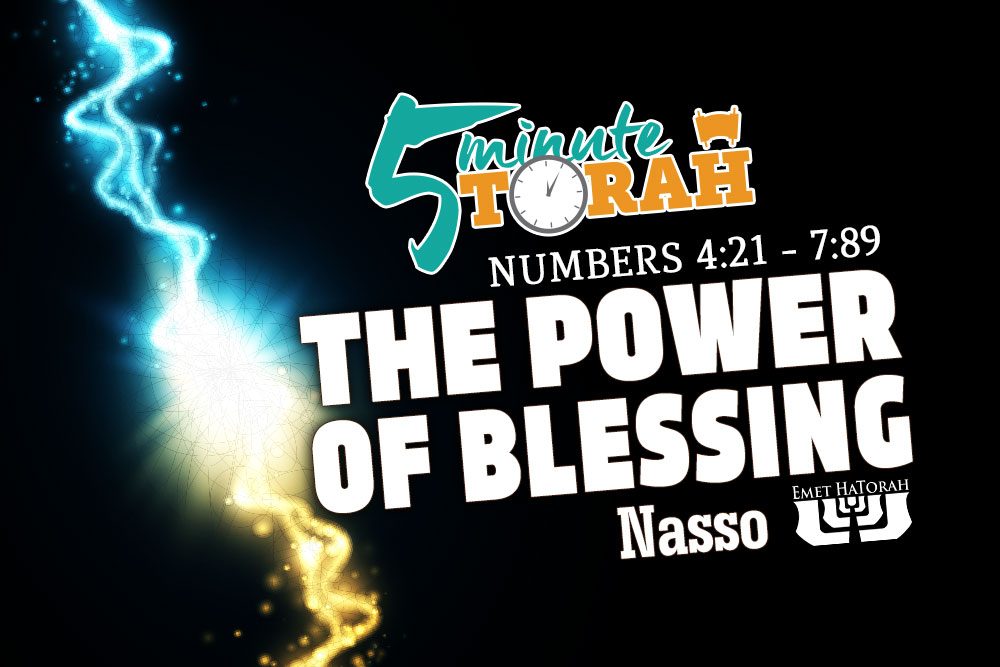The Power of Blessing
Series:

Parashat Nasso - Numbers 4:21 - 7:89
In this week’s parashah, we continue learning about the responsibilities of the Levitical tribes to transport the Tabernacle and its components. In the previous portion we learned about the responsibilities of the Kohathite family, and in our current portion we learn about the responsibilities of the tribes of Gershon and Merari. However, the Torah then transitions into the test for the sotah, the wayward wife, and the laws of the Nazarite. Our parashah concludes by recounting the various offerings brought by the tribal heads for the inauguration service of the Tabernacle. The topic we are going to explore now, however, is six short verses wedged in between the laws of the Nazarite and the dedication offerings. Numbers 6:22–27 records for us what is commonly called the Birchat Kohanim, the Priestly Blessing, also known as the Aaronic Benediction:
The LORD spoke to Moses, saying, “Speak to Aaron and his sons, saying, Thus you shall bless the people of Israel: you shall say to them,
The LORD bless you and keep you;
the LORD make his face to shine upon you and be gracious to you;
the LORD lift up his countenance upon you and give you peace.
So shall they put my name upon the people of Israel, and I will bless them.”
The LORD instructed Aaron and his sons, the Kohanim (the priests), to bless the Children of Israel with this liturgical formulation. Every day across the world, this tripartite blessing is bestowed upon the Jewish people. When it is recited in the synagogue, the congregation turns their eyes away from the Kohen or the one reciting it in the absence of a Kohen. This is to remind us that blessings, particularly this blessing, do not come from the Kohen, but they are something that comes directly from Hashem, as we read, “and I will bless them.” The Kohen is merely the conduit through which this blessing is imparted.
When the blessing is spoken by a Kohen, the congregation responds with “Amen” to affirm the blessing and take possession of it, so to speak. However, when a Kohen is not present and the blessing is recited by a non-Kohen, then the congregation responds with the phrase, “Ken y’hi ratzon,” which means, “May it be so.” Why is the response different when someone who is not a Kohen pronounces the blessing? The person reciting the blessing in place of a Kohen actually prefaces the blessing by saying, “Our God and the God of our fathers, bless us with the three-part blessing in the Torah that was written by the hand of Moses, Your servant, and that was spoken by Aaron and his sons, the Kohanim, Your holy people, as it is said …” Since the Kohen is the one designated to actually bestow this blessing, this preface changes the language from a blessing to a request, to which we respond, “May it be so.”
But do blessings actually have any power? Do humans have the power to impart blessings on individuals by our words? Let’s take a look at the example of when Isaac blessed Jacob in place of Esau. When Esau came in from the field just after Jacob had received his father’s blessing, he expected to receive the blessing reserved for the firstborn. However, as we know, this didn’t happen. When Isaac realized what had happened, he told Esau that Jacob had taken his blessing, saying, “Behold, I have made him lord over you, and all his brothers I have given to him for servants, and with grain and wine I have sustained him. What then can I do for you, my son?” (Genesis 27:37).
If Isaac thought like most of us do in the west, he might have just said, “OK. I retract what I told Jacob. Now, I’ll confer those blessings on you.” But Isaac didn’t think this way, because he knew the power of blessings. He knew that God could speak blessings through him that would affect another person’s life. He also knew that if he simply retracted what he has spoken, it would not change what God had spoken through him. This is why Isaac trembled when he found out that he had blessed Jacob, and he told Esau, “He shall be blessed … he has taken away your blessing.” (Genesis 27:33, 35).
The power of blessing is real, but not a magic formula. We must wield it properly in order for it to be effective. For example, every Friday night we bless our sons that they might be “like Ephraim and Manasseh.” To our daughters we pray they would be “like Sarah, Rebecca, Rachel, and Leah.” But over both our sons and our daughters we recite the Priestly Blessing in the hopes that God would protect them and bless them in the special way that only this blessing speaks of. Pronouncing blessings over others, particularly our children, is a powerful way to instill within them the affirmation that God has a purpose for their lives and that their eyes be opened to see how that will play out if they will allow Him to govern their lives. May we always bless and not curse, and may we live to see these blessings be fulfilled in our lifetime.








